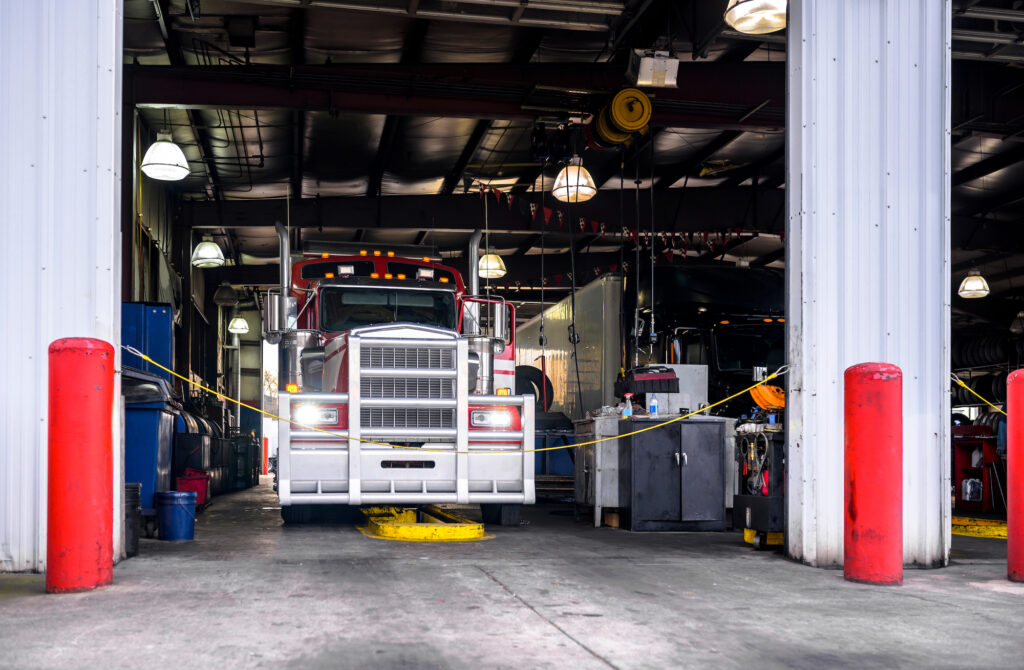Semi trucks are big vehicles with big responsibilities. They play a crucial role in transporting essential goods throughout our country, delivering a whopping 71 percent of the nation’s freight by weight. Without semi trucks on the road, our economy would come to a standstill, and grocery stores and pantry shelves would go bare.
Hauling heavy loads across the country day in and day out, these vehicles require frequent semi-truck repairs and regular maintenance to continue running smoothly. This is why it is so crucial for semi-truck drivers and fleet managers to stay on top of preventative maintenance and have a semi truck repair team they can count on.
As a truck customization and truck collision repair shop, we understand how important it is to keep your semi-truck moving. So we put together this guide to common semi-truck repairs with preventative maintenance tips and advice on finding reliable semi-truck repair shops. Read on so you’re prepared next time the inevitable happens!
The Importance of Quality Semi Truck Repair
Regular maintenance and quality repairs are essential to keeping your semi truck up and running. In addition to ensuring safety on the road, proper maintenance is an investment that can save you money in the long run.
A well-maintained semi-truck is much less likely to break down, minimizing downtime and reducing the need for more costly repairs. Not only that, but it also helps maintain fuel efficiency and prolong the lifespan of your semi.
Common Semi Truck Repairs & Maintenance Tips
Brake repairs: Brake systems are critical for the safe operation of semi trucks, and issues with brakes are one of the most common types of repairs. With semis weighing up to 80,000 pounds, you can probably imagine why that is. Brake pads, rotors, calipers, and other components may need to be replaced or repaired due to wear and tear or damage.
Maintenance tip: Regularly inspect the brake system and replace brake pads before they become too worn down, which can cause damage to the rotors and other components. Also, make sure to have the brake fluid flushed and replaced according to the manufacturer’s recommendations to maintain proper function.
Engine repairs: The engine is the heart of the semi-truck, and issues with the engine can result in decreased performance, reduced fuel efficiency, and other expensive problems. Common engine repairs include fixing oil leaks, replacing damaged parts, and addressing issues with fuel injection or ignition systems.
Maintenance tip: Regularly change the oil and oil filter and ensure the engine is properly lubricated to reduce wear and tear on engine components. It’s also important to perform routine maintenance, such as checking and replacing spark plugs, air filters, and other parts as needed.
Transmission repairs: The transmission is responsible for shifting gears and transmitting power from the engine to the wheels. Transmission repairs may be necessary if there are issues with shifting, slipping, or grinding gears.
Maintenance tip: Regularly check the transmission fluid level and quality and have the fluid and filter replaced according to the manufacturer’s recommendations. Additionally, avoid overloading the vehicle or driving with a heavy foot on the accelerator, as this can put extra stress on the transmission.
Suspension repairs: The suspension system helps to absorb shocks and bumps while driving, and issues with the suspension can lead to a rough ride, uneven tire wear, and other problems. Suspension repairs may involve replacing shocks, struts, springs, or other components.
Maintenance tip: Regularly inspect the suspension system and replace worn or damaged components, such as shocks or struts, to maintain proper function. Avoid driving on rough or uneven terrain whenever possible, and avoid overloading the vehicle, as this can put extra stress on the suspension.
Electrical repairs: Semi trucks have complex electrical systems that grow more complex with each passing year. These systems control various components, including lights, sensors, and communication systems. Electrical repairs may be necessary if there are issues with wiring, fuses, relays, or other components.
Maintenance tip: Regularly check the battery and alternator to ensure that they are functioning properly and have the battery terminals cleaned and tightened as needed. It’s also important to avoid overloading the electrical system by adding too many aftermarket components, which can put a strain on the system.
Cooling system repairs: The cooling system is responsible for regulating the temperature of the engine and preventing overheating. Repairs may be necessary if there are leaks, clogs, or other issues with the cooling system.
Maintenance tip: Regularly check the coolant level and quality and have the coolant flushed and replaced according to the manufacturer’s recommendations. Also, inspect the radiator and hoses for any signs of leaks or damage and replace them as needed to prevent overheating.
Semi Truck Tire Repair & Maintenance
Tire blowouts are another big problem for semi-trucks, and they can be extremely dangerous. Over time, the rubber in the tires can degrade, reducing their safety and reliability.
To keep your drivers, cargo, and other vehicles on the road safe, it’s important to regularly inspect your tires for tread depth, cracks, bulges, uneven wear, and loss of air pressure. You should also keep track of the age of your semi truck tires and replace them according to manufacturer recommendations.
Finding the Right Commercial Truck Repair Shop
No matter how much you stay on top of preventative maintenance, you’ll eventually need a semi truck mechanic that you can trust to get the repair done right the first time around. Ideally, you should find a repair shop before you really need one and keep it in your back pocket so you can get back on the road as quickly as possible.
When looking for a repair shop, consider factors such as experience, reputation, and the range of services available. Ask other semi truck operators for recommendations, do some searching online, and be sure to read customer reviews. Once you’ve narrowed down your search, get a few quotes from different repair shops so that you can compare pricing, level of detail, responsiveness, customer service, and how quickly they can complete the repairs.
The Importance of a Specialized Semi Truck Service Team
Most importantly, you should look for a truck repair service (like PTC!) that specializes in repairing semi-trucks. As semi-trucks are such large and complex vehicles, they require specialized experience, equipment, and facilities. For example, PTC’s Paint Department has a 40-foot paint booth and 60-foot paint booth, allowing us to accommodate paint jobs and touchups for any size truck, from F-150s to 53 ft flatbed trailers, and anything in between.
Semi Truck Repair Financing
You should never agree to a semi-truck repair job without knowing exactly how much it’s going to cost you so that you can budget accordingly. Semi-truck repairs can be expensive, but you may be able to secure commercial truck repair financing to help you out.
Financing options include more traditional business loans for your vehicle, equipment leasing companies, small business term loans, working capital loans, and more specialized commercial truck financing. Factors that affect whether you qualify for semi-truck repair Financing will depend on the lender but may include your overall credit score, your commercial driving experience, and your truck licensing.
Semi Truck Repair Services You Can Trust with PTC!
With our extensive experience providing fleet services for over 15 years, our Van and Truck Collision Repair Department in Portland is fully equipped and staffed to handle any repair need, regardless of truck type or size.
Hidden damage can go unnoticed by an inexperienced eye, resulting in a final bill that exceeds the initial estimate. At PTC, we conduct a thorough inspection and tear-down before providing an estimate to ensure all damage is accounted for. Our expert technicians know what to look for, and we prioritize honest communication to eliminate any uncertainty throughout the collision repair process.
Request a free quote today and we’ll have you back on the road in no time!



